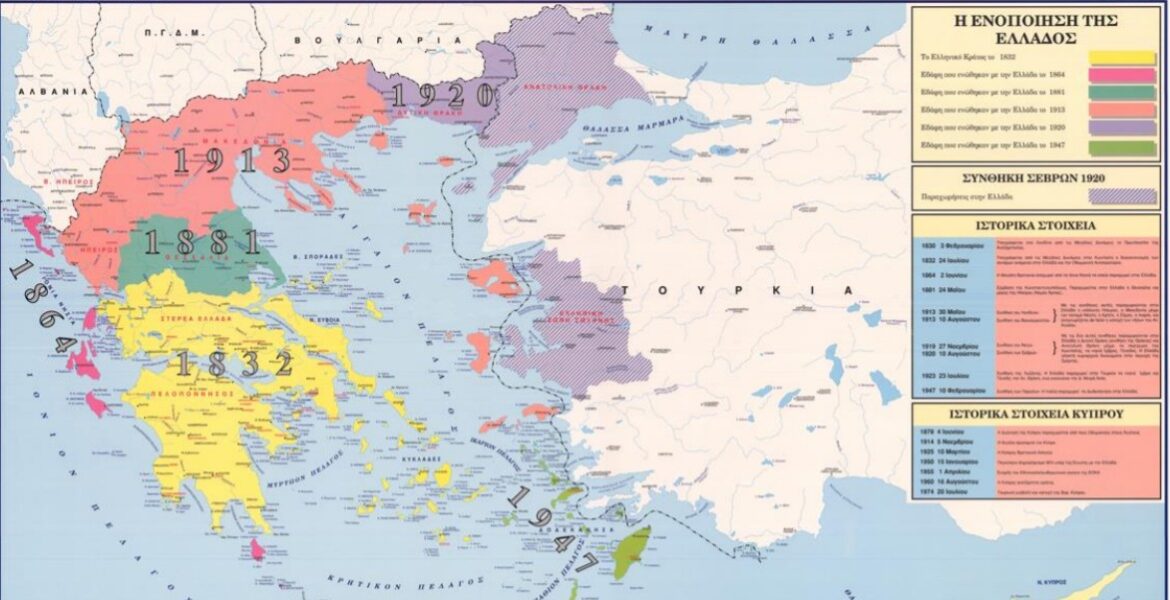May 29 marks the Fall of Constantinople and subsequent Byzantine Empire (known as the Empire of the Greeks in the West) to the Turks in 1453.
For many Greeks, it is considered one of the darkest days in their history and a loss for Hellenism.
Yet, I for one believe this particular date should be used to celebrate not a single moment in history nor a particular battle but rather, as a day to celebrate the triumph of Hellenism over Turkism in the last 200 years.
If we look at the historical record, the Greeks have expanded their sovereign borders six times at the expense of the Turks.
In 1832 the Greeks finally triumphed over the Turks in the Greek War of Independence and liberated the Peloponnese, Central Greece and Aegean Islands (Cyclades and Saronic).
In 1864, the Greeks annexed the Ionian Islands as a means of counterbalancing the Turks (and the Italians).
In 1881 the Greeks annexed Thessaly as a result of their diplomatic skill and to the great displeasure of the Turks.
In 1913, the Greeks again defeated the Turks in the Balkan Wars and liberated Epirus, Macedonia, Crete and additional Aegean Islands (Samothrace, Lemnos, Lesbos, Chios, Samos, Ikaria, et al).
In 1920, the Greeks were awarded Eastern Thrace, Ionia in Asia Minor and Imbros and Tenedos islands with the signing of
the Treaty of Sevres.
However, as a result of the Asia Minor Catastrophe, the Greeks lost these lands but were nonetheless successful at annexing Western
Thrace.
Finally, in 1947, the Greeks annexed further Aegean Islands (Dodecanese) for their involvement in WWII which the Turks had in their sights.
The simple fact remains, that the Greeks have increased their sovereignty while the Turks have lost theirs.
In the present day, the Greeks are champions in the game of geopolitics and their foreign policy is a further detriment to the Turks.
The Greeks have remained steadfast in the Aegean dispute and maintained the integrity of their sovereignty, territorial waters, national airspace, the continental shelf, Exclusive Economic Zone, and the Athens Flight Information Region.
An important note to make here is the Greek extension of territorial waters in the Ionian Sea to 12 nautical miles, which will soon be extended to Crete and the Aegean in due course.
Despite Turkish aggression, the Greeks will never allow changes in the status quo nor resolutions in the Greek-dominated Aegean Sea that contradict international law, which is clearly in accordance with the Greek side.
With regard to the Cyprus dispute, the Greeks have in all but name reached enosis or union with the island vis-à-vis their dual membership in the European Union, and all the benefits this brings.
Under these circumstances, here again, there is simply no rush by the Greeks to reach any resolutions with the Turks that justifies the
invasion and occupation of one-third of the island which to this day is unrecognised by the international community.
The Greeks have also remained defiant in preserving their thousands year old Greek minority status in Turkey through various political, economic and social assistance.
Despite Turkey’s policy to “leave no Greek in Constantinople” or in Turkey at all for that matter, let me state clearly that the Greeks will always remain in Constantinople regardless of the number is 5000, 3000, or just the Patriarch himself, and regardless if churches such as the Hagia Sofia are converted into mosques or schools such as the Halki Seminary are closed.
The Greeks are fully aware that new and bigger churches can always be rebuilt, and new schools can always be reopened, but not even the pseudo-Sultan Erdogan would dare deny the existence of the Patriarchate, the Second Rome, home of 300 million strong Orthodox Christians.
Looking toward the future, the Greeks should not hesitate to adopt a set of red line self-defence policies that would no doubt cause havoc for the Turks if they attacked, as was the case in Cyprus in 1974.
If attacked by the Turks in the Aegean Islands, the Greek counterattack should take place on Imbros and Tenedos islands for strategic purposes to blockade the Dardanelles.
If attacked in Greek Thrace, the counterattack should take place in Eastern Thrace whereas much territory is gained as possible, namely within firing distance from Constantinople.
If attacked in Cyprus, the counter-attack should take place to rid the island of the Turkish occupation Army and
protect the Greek community at all costs.
If attacked by the Turks from Albania, i.e. from the Pasha Liman Base, the Greek counterattack should take place in Northern Epirus to protect the Greeks also living there.
A second counterattack should also take place on Sason island for additional strategic
purposes in the Ionian Sea and the Adriatic Sea.
It is important to remember that a prolonged battle or war between the two sides will not endure, so any attempts deep into Asia Minor are not feasible.
Nevertheless, it is imperative that any Greek counter-attack is swift and with precision.
In the interest of self-defence, the Greek gains could be significant.
It is therefore most evident that despite setbacks such as the Asia Minor Catastrophe or significant losses such as the Greek Genocide, the Greeks are clearly determined and patient, but to what end?
Perhaps it is a certain Great Idea that eternally burns in the hearts and minds of all Greeks?
Only time will tell, but nevertheless, it is for these reasons that May 29, in my book, is
a day of triumph for Hellenism.
The Anonymous Hellene
Read More On this day in 1902, the Antikythera Mechanism was discovered

